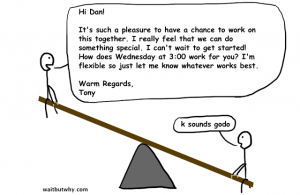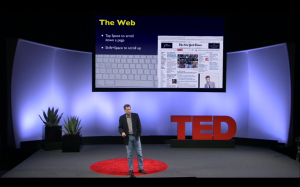 Email is a necessary part of everyday life today. This cartoon-illustrated article outlines many of the most uncomfortable aspects of email, and provides suggestions for minimizing discomfort.
Email is a necessary part of everyday life today. This cartoon-illustrated article outlines many of the most uncomfortable aspects of email, and provides suggestions for minimizing discomfort.
waitbutwhy.com/2013/12/11-awkward-things-about-email.html
Category: -Context
 The Internet makes it possible for people to collaborate on a massive scale, working together to accomplish tasks that might otherwise be impossible. The world of online collaboration is changing rapidly—and changing our lives in the process. Many TED talks and NPR podcasts have helped us to understand the applications and implications of collaborative technology. In this fascinating radio program, TED and NPR collaborate to explore collaboration by combining excerpts from several TED talks with interviews and commentary.
The Internet makes it possible for people to collaborate on a massive scale, working together to accomplish tasks that might otherwise be impossible. The world of online collaboration is changing rapidly—and changing our lives in the process. Many TED talks and NPR podcasts have helped us to understand the applications and implications of collaborative technology. In this fascinating radio program, TED and NPR collaborate to explore collaboration by combining excerpts from several TED talks with interviews and commentary.
www.npr.org/2013/07/13/197986218/why-we-collaborate
 Patents have been part of American life since the country was born—they were written into the constitution to legally protect and encourage innovation, creativity, and productivity. But today, patents are used by shadowy companies that make nothing more than profits—and the threat of lawsuits from these companies is enough to keep people from creating high-tech products, companies, and jobs. This episode of This American Life shines a bright light on the broken intellectual property legal system by telling the stories of people whose lives have been profoundly impacted by that system.
Patents have been part of American life since the country was born—they were written into the constitution to legally protect and encourage innovation, creativity, and productivity. But today, patents are used by shadowy companies that make nothing more than profits—and the threat of lawsuits from these companies is enough to keep people from creating high-tech products, companies, and jobs. This episode of This American Life shines a bright light on the broken intellectual property legal system by telling the stories of people whose lives have been profoundly impacted by that system.
thisamericanlife.org/radio-archives/episode/496/when-patents-attack-part-two
 MIDI is the communication standard for electronic musical instruments. This 30-year-old technology has revolutionized the music industry. This NPR piece explains why and how MIDI made digital music happen.
MIDI is the communication standard for electronic musical instruments. This 30-year-old technology has revolutionized the music industry. This NPR piece explains why and how MIDI made digital music happen.
npr.org/blogs/therecord/2013/05/12/182874125/the-midi-revolution-synthesizing-music-for-the-masses
 David Pogue is one of the most prolific–and entertaining–tech writers we know. In this short TED talk, he runs through a list of tips that can save you time every day. Don’t miss it.
David Pogue is one of the most prolific–and entertaining–tech writers we know. In this short TED talk, he runs through a list of tips that can save you time every day. Don’t miss it.
When you post something on Facebook, stream a movie from Netflix, or share data with Dropbox, you’re using “the cloud.” Apple’s iCloud makes it possible for 250 million people to store their music, appointments, and documents “out there” and effortlessly access them via iPhones, iPads, Macs, and other digital devices. But what, and where, is the cloud, and how does it work? This slightly technical Wired article examines the futuristic technology inside the cloud—technology that’s likely to find its way into future PCs, tablets, and phones.
wired.com/wiredenterprise/2013/03/flash-fusion-io-apple-facebook/all
NPR’s Radiolab is radio at its best—entertaining, informative, provocative. This episode will change the way you think about time and speed. One segment reveals the surprising truth about the relative speeds of the human nervous system and the Internet, and the a critical role of speed in today’s computer-controlled financial marketplace.
radiolab.org/2013/feb/05
If you don’t understand how the stock market works, you’re not alone. The market has developed a digital mind of its own, and in many ways it’s beyond human comprehension. The blog that accompanies that story includes some dazzling animated visualizations.
In his state of the union message President Obama explained that he was issuing executive orders to deal with cyber threats to government and business. He also encouraged congress to enact legislation. But as this NPR story explains, the problem may require a more aggressive approach that’s complicated by the fact that our information infrastructure is mostly owned by private businesses.
npr.org/2013/02/13/171843046/victims-of-cyberattacks-now-going-on-offense-against-intruders
Hashtag 101
When the American Dialect Society named “hashtag” the word of the year, they chose a word that means nothing to millions of people who don’t tweet. If you’re one of those people, this NPR story will help you to understand why so many words these days are preceded by #.
npr.org/2013/01/08/168883343/the-art-and-strategy-of-the-hashtag
In the ongoing debate about the impact of video games on the human brain, emotional arguments are seldom grounded in solid research. In this TED talk, Daphne Bavelier claims that current research contradicts many common-sense beliefs about the psychological impact of fast-paced gaming. The research is still in the early stages; after all, computer gaming is a relatively new human activity. And there remain questions about violence, addiction, and other big issues. But the research described here is a small step toward understanding how what we do changes who we are.
http://www.ted.com/talks/daphne_bavelier_your_brain_on_video_games.html